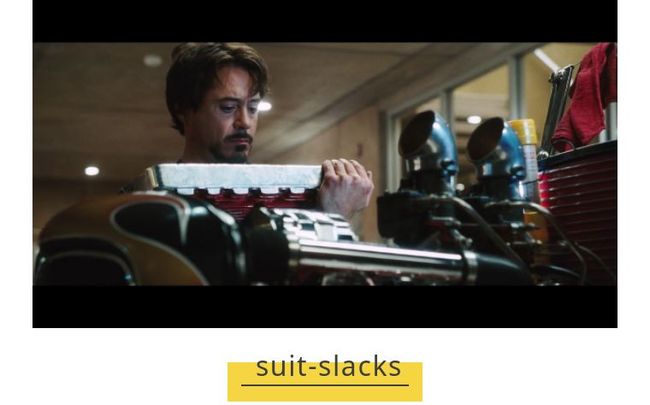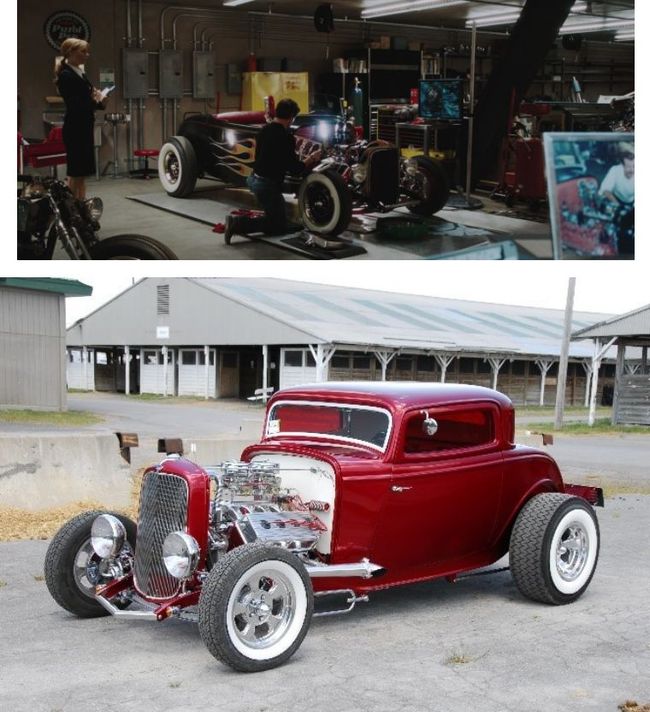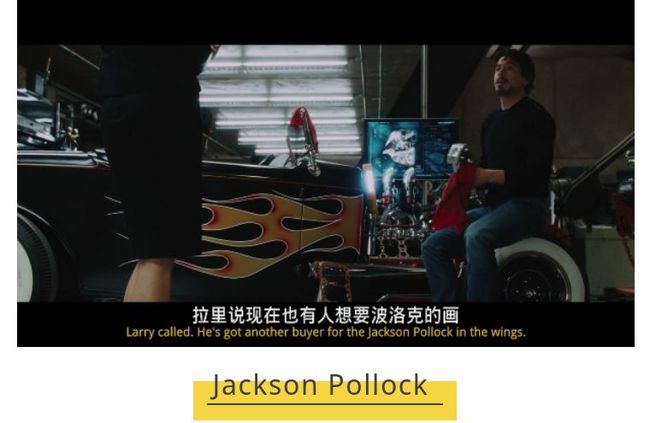Tony, in suit-slacks and an undershirt, grimy from working on a classic ‘32 Ford.
昨晚与女记者滚完床单,Tony转天一大早就跑到工作间,专心致志地改装起车子。
slack常作为形容词来使用,指“不紧的,松的”(not tight, loose)。
▫These tent rope are too slack—they need tightening. 这些帐篷绳太松了——需要把它们紧一紧。
而当slack做名词时,则指不太紧的裤子,也就是我们平时穿的休闲裤(trousers, especially for casual wear)。和trousers一样,slacks做“裤子”之意,时,常为复数。
那么,suit-slacks,顾名思义,即指西服套装的宽松裤子。
undershirt([ˈʌn.dɚ.ʃɝːt]),英式英语中也写做vest,指“(衬衣等里面贴身穿的)背心,汗衫”(a piece of underwear worn under a shirt, etc, next to the skin)。
最常见的男士贴身背心,无疑就是咱们俗称的“跨栏背心”,你可以简单粗暴地称它为Sleeveless Undershirt,或者,它还有一个很霸气侧漏的昵称叫“Tank Top”(可以亮出手臂结实的肌肉)。如果要直译为Hurdle Slim T-shirt也可以,但前面最好强调一下是Sleeveless的。
grimy ([ˈɡraɪ.mi]),形容词,指“满是污垢的,肮脏的”(covered with or characterized by diry)。
▫The child's face was grimy and streaked with tears.那个孩子脸上满是污垢,还挂着道道泪痕。
grimy源自于名词grime([ɡraɪm])。grim指“污垢,尘垢,积垢”(a layer of dirt on skin or on a building)。
▫The walls were covered with grime.墙上满是污垢。
那么,dirt和grime有什么区别呢?
大体上,这两个词是可以互换的,只是dirt的使用频率显然要比grime高。不过,要说区别的话,还是有那么一点点。
首先,dirt相对比较中立,即对客观事实的描述,例如,the dirt on a car, clothing, the floor,等等,这些东西落上污垢是不可避免的,你把它们清洗干净就好了。但grime清洗起来要比dirt更麻烦,也会给人一种很不好的体感。同样是落在衣服上的污渍,dirt可能指的是泥印、尘土之类的,而grime则侧重于油污等不好清洗的东西,而且看起来很脏,让你感觉很不舒服。
其次,grime不仅指实际的污垢,也可以用于比喻,例如某个城市治安很乱,我们常会用“肮脏”来形容它,这时用grime就比dirt更符合语境。
Tony正在修的这辆车就是经典的1932年福特车。BTW,修车这个情节可不是随便拍的哟,因为后面Tony在做新战甲时,外漆的经典酒红色就是参考的这辆古董车。
Give me an exploded view.
Tony命Jarvis显示气缸的爆炸图。
exploded view,俗称“爆炸图”,也翻译成“分解图”,即将一个组件的主要零件,以立体的方式拆分显示,在机械图纸中属于很常见的类型。
I'll keep you posted.
忙碌的Pepper边打电话告知对方有最新情况会通知,边推门进到工作室内
keep sb posted指“不断(向某人)更新最新情况”(to make sure that someone always knows what is happening)。
▫Keep me posted on anything that happens while I'm away. 在我离开期间,随时告诉我最新的情况。
Like a champ.
Tony问起昨晚和她滚床单的女记者有什么反应。Pepper不屑地说,“她就好像赢了大奖似的”。
champ([tʃæmp])是champion的非正式说法,指“冠军,获胜者”。
能够和大名鼎鼎的Tony滚一把床单,Pepper形容那个女人“Like a champ”还真是挺讽刺的。
Why are you trying to hustle me out of here?
听到女记者的反应后,Tony有点抱怨道,“你不应该赶我离开别墅的。”
hustle([ˈhʌs.əl]),及物动词指“推搡,推挤(某人)”(to make someone move quickly by pushing or pulling them along)。所以,hustle sb out of sp,就是“将某人推搡出某地”。
▫After giving his speech, Johnson was hustled out of the hall by bodyguards. 演讲结束后,约翰逊被保镖们簇拥着出了大厅。
看到hustle,就会不禁想到bustle,这两个词常常“结伴”出现,构成短语hustle and bustle。不过,它不是动词短语,而是名词短语,指“喧闹嘈杂”(noise and activity)。
▫I love the hustle and bustle of the marketplace.我喜欢市场里的熙攘喧闹。
I thought with it being my plane and all, that it would just wait for me to get there.
Pepper提醒Tony,按计划,他的飞机一个半小时前就该起飞了。Tony不以为然,“既然是我的私人飞机,我不到,它怎么会飞呢。”(哼,有钱人的任性啊……)
这句台词出现了think with的用法。我们知道,think可以搭配介词about、of,或that引导的宾语从句,但think with却很少见。
当然,think with的用法也是有的,with在这里用来指“凭借某工具”,所以think with即“靠……来思考”。
▫ We talk with our mouth, but we think with our head.我们用嘴说话,但我们用脑思考。
显然,台词中的think with不是这种的用法。其实,我们把台词的短句顺序换一个位置就一目了然了,I thought that it would just wait for me to get there with it being my plane and all.
with在这句话中相当于because的作用,Tony为了强调它是自己的私人飞机,于是把with引导的原因状语提前了。
Larry called. He's got another buyer for the Jackson Pollock in the wings
Pepper要抓紧时间向Tony回报几件事情,首先是买艺术品的事。
杰克逊·波洛克(1912-1956),美国画家,抽象表现主义绘画大师,也被公认为是美国现代绘画摆脱欧洲标准,在国际艺坛建立领导地位的第一功臣。
波洛克生前的工作室和故居都位于美国纽约州的斯普林斯(Springs)。但Tony似乎不太懂艺术,至少不了解波洛克,以为Springs是波洛克在春季的作品,因为波洛克的代表作中有一副叫《秋韵:第30号》(Autumn Rhythm (Number 30))。
in the wings,或wait in the wings,指“准备就绪;随时可使用”(If something is in the wings, it is about to happen or be made public.)。
▫More bad news could be in the wings in the form of rises in licence fees. 更多坏消息可能会以提供许可费的方式出现。
I think it's a fair example. I think it's incredibly overpriced.
Tony没想好要不要买这幅画,询问Pepper的意见。Pepper觉得画的一般,而且价格太贵。
fair在这里指“不好不坏的,一般的”(neither very good nor very bad)。
▫I was fair at science but it was never my thing.我理科成绩还算过得去,但我从来都不喜欢理科。
example,我们都很熟悉了,是指“例子,案例”,只有具有典型特点才能作为例子,所以它也可以指某物艺术家或创作者的代表作(something that is typical of the group of things)。
▫This painting is a marvellous example of her work. 这幅画是她非常出色的代表作。
那么,“it's a fair example.”的意思就是“这是他比较一般的代表作。”
The MIT commencement speech...
Pepper汇报的第二件事,是Tony的母校MIT想请他去做毕业演讲。
commencement([kəˈmens.mənt]),名词,指“学位授予典礼;(大学或高中)毕业典礼”(a ceremony at which students formally receive their degrees)。需注意,commencement已含有典礼的意思,不需要在后面再加上ceremony。
▫ He was invited to speak at the commencement.他受邀在毕业典礼上讲话。
commencement是美式英语的说法,而英式英语中还是习惯使用graduation ceremony。
Please, don't harangue me about stuff that's way, way, down...
毕业典礼是在6月,Tony提醒Pepper别拿那么老远的事情来烦他。
harangue([həˈræŋ]),源自于法语,也写作harangué,一开始仅作为名词使用,本意是指“公开的演说”(a public address, public discourse),后来演变出“义愤填膺的谴责;慷慨激昂的劝说”的意思(a long loud angry speech that criticizes sb/sth or tries to persuade people to do sth)。
因为harangue含有speech之意,如果用它来表达“谴责、批评”之类的意思,则给人一种长篇大论、没完没了的负面感觉。
▫She gave her son a harangue about the dangers of playing in the street.她很严厉的批评了儿子,在大街上玩是很危险的。
而现在,harangue更多被当做动词,尤其是及物动词,指“长篇大论地演说;斥责”(to speak to someone or a group of people, often for a long time, in a forceful and sometimes angry way, especially to persuade them)。
▫ A drunk in the station was haranguing passers-by. 一名醉汉在车站大声训斥路人。
Deflect it and absorb it. Don't transmit it back to me.
Tony告诉Pepper,以后再有这种事情,你替我挡掉就好,别来烦我。
动词deflect([dɪˈflekt]),虽然及物或不及物都可以,但及物的使用会更常见,指“使某物转向或偏斜”(to cause to change direct, or to prevent sth from being directed at you)。
▫He deflected the ball away from the goal.他把球挡住了球门。
Tony的这句“deflect it”其实是简化的说法,完整应该是“You should deflect it from me”。
A deflect sth from B,也是经常出现的一个短语,意思是“由A替B去处理sth”(to cause B to veer away from sth)。
▫That’s why I have an assistant—she deflects all of this minutes away from me.这就是我为什么要有一个助理的原因——她会替我处理所有会议记录。
absorb最基本的意思是“吸收(液体、气体)等”(to take in a liquid, gas or other substance from the surface or space)。
▫Plants absorb oxygen. 植物吸收氧气。
而台词中的absorb则是对以上基本意思的延伸,当主语为人时,absorb sth就是“记住、理解、掌握sth”(to take sth into the mind and learn or understand it)。
▫It’s a lot of information to absorb all at once.要一下子消化这么多资料,真是很难。
所以,Tony说“absorb it”,就是要Pepper替他记着这件事就行了。
What are you trying to get rid of me for?
Tony发现Pepper这么急着打发他走,肯定有问题啊。
当get rid of 后接sth时,一般有两个意思:
一是“清除,去除,丢弃”(to remove or throw away sth unwanted)
▫ I used weedkiller to get rid of the weeds in the garden. 我用了除草剂来除去花园里的杂草。
二是“处理掉,卖掉”(to sell an old or unwanted possession)
▫ Have you managed to get rid of your old Volvo yet? 你处理掉你的旧沃尔沃车了吗?
而当get rid of后接sb时,则是“赶走,打发走sb”的意思(to send away someone annoying or to persuade them to leave)。
▫We got rid of our unwelcome guests by saying we had to go to bed. 我们说必须要上床睡觉了,这才把那一帮不受欢迎的客人打发走。
Very tasteful.
得知Pepper要过生日,Tony很“大方”地说,“替我买份礼物”。Pepper讽刺他已经买完了,还“夸”Tony送的礼物很有品位。
tasteful,形容词,既可以做表语,也可以做定语,指“雅致的;趣味高雅的;有品位的”(attractive and chosen for style and quality)。其比较级和最高级是在前面加more和most。
▫Their house is very tasteful, but it doesn't have any soul. 他们的房子很雅致,但我总觉得少了点儿个性。































